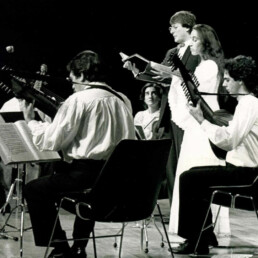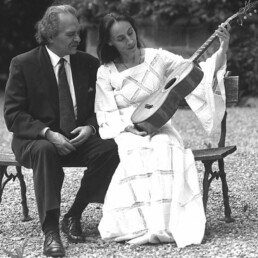Born in Buenos Aires to a family of Spanish descent, he came into his own as a virtuoso guitarist from a very young age. When only nineteen, he made his first tour of South America receiving rave reviews. Four years later, he won the first prize and gold medal at the yearly Interpretation Competition in Argentina.
In 1962 he moved to Madrid to follow the great Maestro Narciso Yepes and immediately began to do concerts throughout Spain. From 1965, he began to perfect his studies in early music, passionately researching into -and trying to popularize it – the work of Spanish vihuelists, choosing the vihuela and the lute as his concert instruments. In 1968 he founded the LEMA Group, “Labour and Style in Early Music” together with Mariano Martín and Marcial Moreiras. Later on, he was joined by the Argentinian Soprano Matilde Pérez Berlanda and they will together make outstanding record productions. He was director of the Early Music Department at the Instituto Psicopedagogico de las Artes de Madrid.
Between 1973 and 1974, Fresno published several volumes of Antologia de los vihuelistas espanoles (Anthology of Spanish vihuelists: works for vihuela, renaissance lute and guitar). His keen interest, his study of various treatises as well as his deep knowledge of early music, determined his ultimate dedication to it, making him one of the first interpreters of Spanish and European music of the sixteenth and nineteenth centuries to use historical instruments (vihuela, lute, theorbo, baroque and romantic guitar) and to apply the technique and style from various eras.
In addition to been invited to participate in major international music festivals in Amsterdam, Berlin, Weilburg, Frankfurt, Siena, Milan, Florence, Belgrade, Saintes, Estella, Madrid, Barcelona and Santander , he make recordings for Dutch, Spanish, Swiss and Italian television and also for Radio RIAS in Berlin, Hilvesum in the Netherlands, Radio France, Radio Suiza, RAI and Radio Nacional in Spain.
In 1978, together with the Swiss soprano Rosa Maria MeisterJorge Fresno created the international Group , Albicastro Ensemble in Bern whose aim was that of studying and disseminating early Spanish, Italian and German music. The Ensemble was invited to take part in renowned specialized festivals and realized several first world recordings.
Jorge Fresno has distinguished himself for his work on recovering and disseminating the music of Gaspar Sanz, culminating in the world’s first baroque guitar recording of his complete works made by Fresno and produced by the Aragon Pavilion for the 1992 Seville Exposition.
In 1998 he conceived and directed the Gaspar Sanz Guitar Series, organized and sponsored by the Cortes de Aragón which was then held regularly for five years in the Throne Room of the Aljafería Palace In Zaragoza, to great public and critical acclaim.
A lecturer since 1985 at the Conservatoire de Musique de Neuchâtel (Switzerland), the Conservatoire Superior de Cuenca and the J.R. Santa Maria Musis Studi (Zaragoza) , he has taught vihuela, baroque guitar, basso continuo, theorbo and romantic guitar at the International Early Music Course in Daroca. Moreover, he has held numerous international seminars and courses in Saintes (France), Sardinia, Florence, Rome, Verona, Urbino (Italy), Yugoslavia as well as Madrid, Granada and Cuenca.




